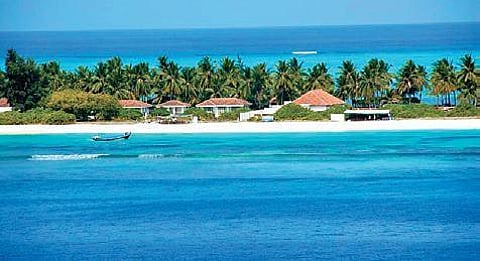

The beautiful islands of Lakshadweep are in the news for all wrong reasons. Many people in the Union Territory (UT) are agitating against the draft reforms proposed by the administrator. In an island with almost 95 percent Muslims with tribal status, some of the proposed laws include the Lakshadweep Animal Preservation Regulation, the Lakshadweep Development Authority Regulation, the Prevention of Anti-Social Activities Regulation, and the Lakshadweep Panchayat Regulation. A political storm is brewing, with politicians on either end of the spectrum smelling an opportunity to further their careers by catering to their core base. One can keep arguing whether these laws would bring any positive changes or not for the people of Lakshadweep till the end of the world without arriving at any conclusion.
The opinion of the people who are affected is brushed away with disdain by both sides. There is no way to know whether the people of Lakshadweep want these reforms or not, as they have little say in the islands’ administration. In a democratic country, the people are supposed to have a say in their future, which is true in the 28 states of the country. The elected government represents the people of the state, and one can argue that any reform represents the will of the people.
Unfortunately, in India, some lesser citizens have to swallow whatever is thrust down their throats by their rulers with no recourse to hold them responsible. These people live in eight Union Territories of India. A few of them have partial democracy, where they can have a namesake chief minister with limited powers. The people of Delhi and Puducherry have the right to elect a Legislative Assembly that has limited powers. The UT of Jammu and Kashmir has no Assembly now.
The other five UTs are at the mercy of the appointees of the Central government. Mostly, the lieutenant governors or administrators have no stakes or relationship with the places they govern. In effect, we have two kinds of citizens in our country—those of states, who have a say in their governance and the other in UTs, who are at the mercy of whims and fancies of the political appointees of the Union government.
When the UTs were introduced in the States Reorganisation Act, 1956, the reason was that such territories are too small to be independent or are too different (economically, culturally and geographically) to be merged with the surrounding states or are financially weak or are politically unstable. They need to be administered by the Union government. In 1956, we had 14 states and six UTs. Over the years, the number of states increased to 28 and UTs to eight. Himachal Pradesh, Manipur, Tripura, Sikkim, Goa, Arunachal Pradesh and Mizoram are some UTs that became full states since the 1960s. Some of them achieved statehood after prolonged violent agitations.
There is no rhyme or reason now for many UTs to exist as UTs unless the idea is to use the post of an administrator or a lieutenant governor to accommodate politicians with a problematic past or no future. Tripura with an estimated population of 37 lakh, Manipur with 29 lakh, Meghalaya with 30 lakh, Nagaland with 20 lakh, Arunachal Pradesh with 14 lakh, Mizoram with 11 lakh, Goa with 16 lakh and Sikkim with six lakh are full-fledged states.
Delhi with a population of 1.7 crore, Jammu and Kashmir with 1.2 crore, Puducherry with a population of 13 lakh, Chandigarh with 11 lakh and Dadra and Nagar Haveli with six lakh, Andaman and Nicobar Islands with four lakh are UTs. In short, the population or size is no criteria for deciding whether people deserve a state or a UT. Neither the argument that these UTs have a distinct culture and hence need to be protected holds water. There is no great cultural chasm separating them from the neighbouring states for smaller UTs like Daman and Diu or Puducherry. A referendum can decide whether UTs want to merge with the neighbouring states with which they have cultural and linguistic ties or whether they want to be a separate state. For the larger UTs, wouldn’t it be better to have full statehood to protect their unique culture than being ruled by a viceroy from Delhi?
There are 3.68 crore Indians living in eight UTs of India who are denied the democratic right of having their Assemblies with full powers as enjoyed by those living in the 28 states. The people of UTs should have a say in how their lands ought to be used, whether they want to preserve their traditions or culture, what they should eat, which language they should speak or whether they wish for mega infrastructure projects. They should have the power to hold their rulers accountable and change them with the vote if they fail. UTs should not remain anything better than colonies to be exploited. It is the duty of all Indians, irrespective of whether their domicile is in a full-fledged state or UTs, to raise voice to end this vestige of colonialism. UTs are an anomaly, and the concept belongs to the dustbin of history.
Anand Neelakantan
mail@asura.co.in
Author of Asura, Ajaya series, Vanara and Bahubali trilogy